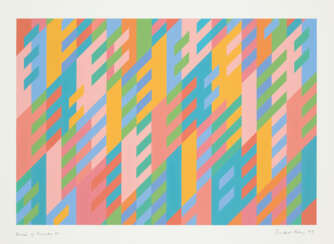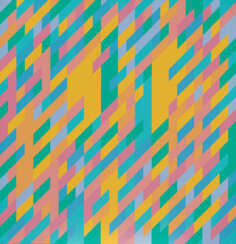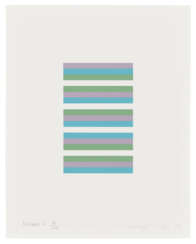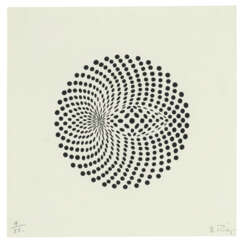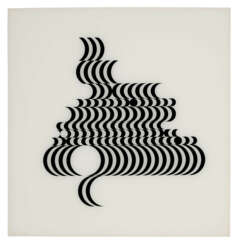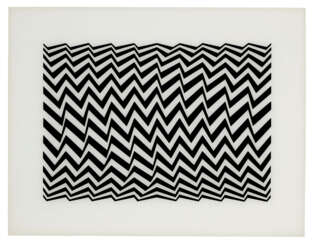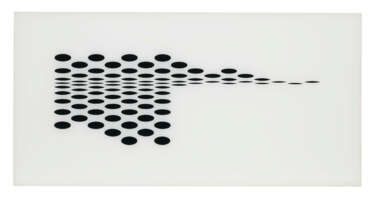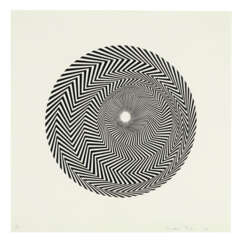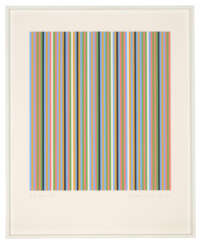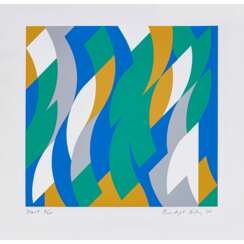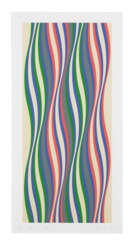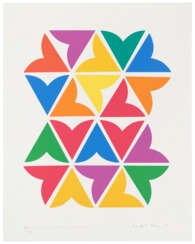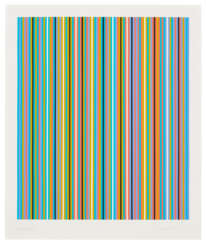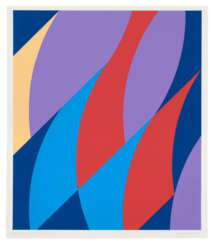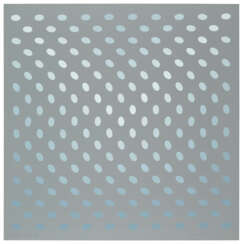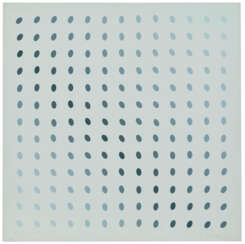Bridget Riley (1931) — Auction price
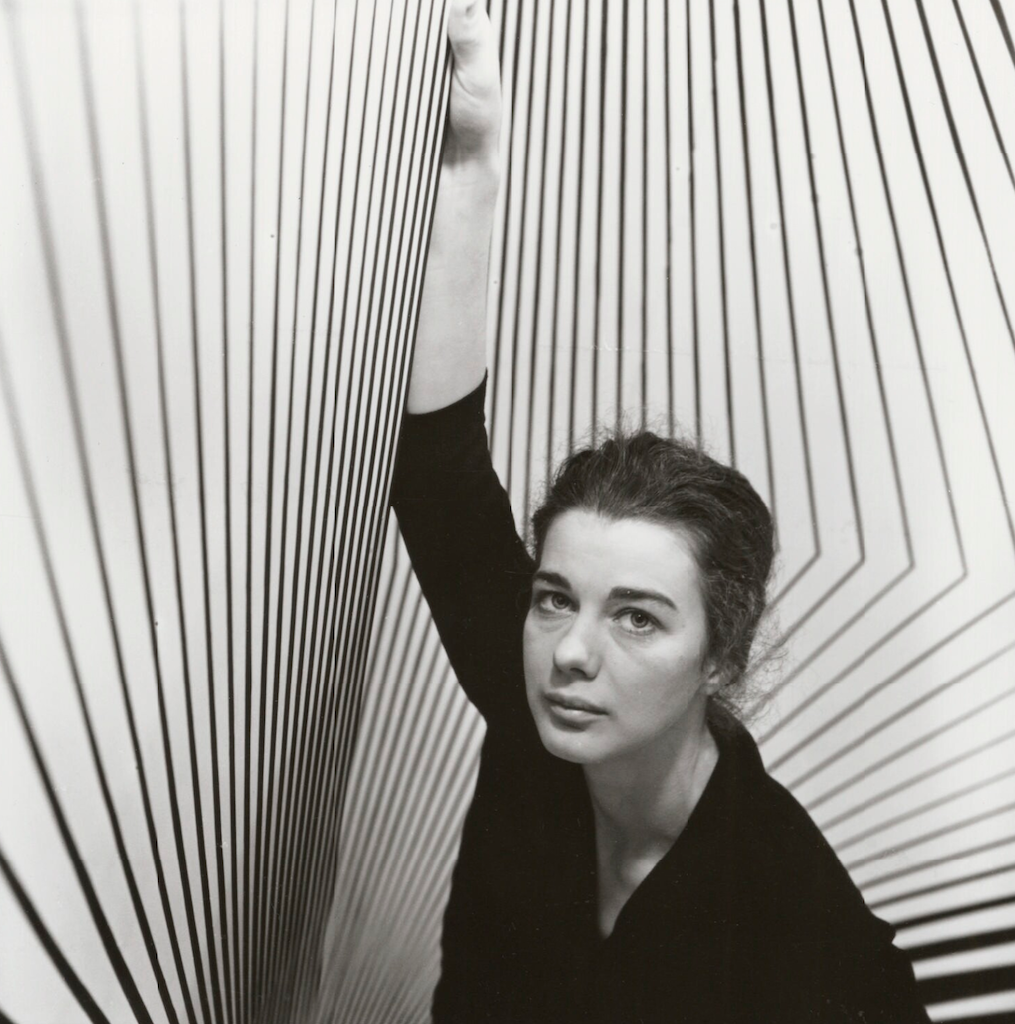
Bridget Louise Riley, an eminent English painter, has captivated the art world with her pioneering contributions to the Op Art movement. Born in London in 1931, Riley's early works were characterized by a figurative, semi-impressionist style. However, her artistic trajectory took a significant turn in the late 1950s and early 1960s when she began experimenting with optical illusions, leading to the development of her signature Op Art style. These works, utilizing geometric patterns in black and white, explored the dynamics of perception, creating disorienting effects and sensations of movement or color in the viewer.
Riley's exploration into color, which commenced in 1967, marked a new phase in her career. Her visit to Egypt in the early 1980s further enriched her palette, leading to the creation of works that reflected the vibrant hues of the Egyptian landscape. This period also saw the introduction of her 'Egyptian palette', which captured both the spirit of ancient and modern Egypt. Notable among her colorful works is "Cataract 3", where Riley utilized the contrast between warm and cold colors to produce a shifting, dynamic effect on the canvas, a testament to her continuous exploration of the interaction between form, color, and human perception.
Riley's work extends beyond canvas, with significant contributions to public art through murals. Her installations at prestigious institutions like the Tate, the Musée d'Art Moderne de la Ville de Paris, and the National Gallery, as well as a large-scale mural for the Chinati Foundation in Marfa, Texas, demonstrate her versatility and commitment to engaging with a broader public audience.
For collectors and experts in art and antiques, Riley's work represents a fascinating intersection of art, science, and perception, offering a unique visual experience that challenges and delights. Her dedication to expanding the boundaries of visual art ensures her place as a central figure in contemporary art discourse.
Sign up for updates related to Bridget Louise Riley to stay informed about new product sales and auction events showcasing her groundbreaking work. Join us in celebrating the legacy and ongoing journey of one of the foremost exponents of optical art.


Bridget Louise Riley, an eminent English painter, has captivated the art world with her pioneering contributions to the Op Art movement. Born in London in 1931, Riley's early works were characterized by a figurative, semi-impressionist style. However, her artistic trajectory took a significant turn in the late 1950s and early 1960s when she began experimenting with optical illusions, leading to the development of her signature Op Art style. These works, utilizing geometric patterns in black and white, explored the dynamics of perception, creating disorienting effects and sensations of movement or color in the viewer.
Riley's exploration into color, which commenced in 1967, marked a new phase in her career. Her visit to Egypt in the early 1980s further enriched her palette, leading to the creation of works that reflected the vibrant hues of the Egyptian landscape. This period also saw the introduction of her 'Egyptian palette', which captured both the spirit of ancient and modern Egypt. Notable among her colorful works is "Cataract 3", where Riley utilized the contrast between warm and cold colors to produce a shifting, dynamic effect on the canvas, a testament to her continuous exploration of the interaction between form, color, and human perception.
Riley's work extends beyond canvas, with significant contributions to public art through murals. Her installations at prestigious institutions like the Tate, the Musée d'Art Moderne de la Ville de Paris, and the National Gallery, as well as a large-scale mural for the Chinati Foundation in Marfa, Texas, demonstrate her versatility and commitment to engaging with a broader public audience.
For collectors and experts in art and antiques, Riley's work represents a fascinating intersection of art, science, and perception, offering a unique visual experience that challenges and delights. Her dedication to expanding the boundaries of visual art ensures her place as a central figure in contemporary art discourse.
Sign up for updates related to Bridget Louise Riley to stay informed about new product sales and auction events showcasing her groundbreaking work. Join us in celebrating the legacy and ongoing journey of one of the foremost exponents of optical art.
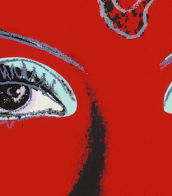

Bridget Louise Riley, an eminent English painter, has captivated the art world with her pioneering contributions to the Op Art movement. Born in London in 1931, Riley's early works were characterized by a figurative, semi-impressionist style. However, her artistic trajectory took a significant turn in the late 1950s and early 1960s when she began experimenting with optical illusions, leading to the development of her signature Op Art style. These works, utilizing geometric patterns in black and white, explored the dynamics of perception, creating disorienting effects and sensations of movement or color in the viewer.
Riley's exploration into color, which commenced in 1967, marked a new phase in her career. Her visit to Egypt in the early 1980s further enriched her palette, leading to the creation of works that reflected the vibrant hues of the Egyptian landscape. This period also saw the introduction of her 'Egyptian palette', which captured both the spirit of ancient and modern Egypt. Notable among her colorful works is "Cataract 3", where Riley utilized the contrast between warm and cold colors to produce a shifting, dynamic effect on the canvas, a testament to her continuous exploration of the interaction between form, color, and human perception.
Riley's work extends beyond canvas, with significant contributions to public art through murals. Her installations at prestigious institutions like the Tate, the Musée d'Art Moderne de la Ville de Paris, and the National Gallery, as well as a large-scale mural for the Chinati Foundation in Marfa, Texas, demonstrate her versatility and commitment to engaging with a broader public audience.
For collectors and experts in art and antiques, Riley's work represents a fascinating intersection of art, science, and perception, offering a unique visual experience that challenges and delights. Her dedication to expanding the boundaries of visual art ensures her place as a central figure in contemporary art discourse.
Sign up for updates related to Bridget Louise Riley to stay informed about new product sales and auction events showcasing her groundbreaking work. Join us in celebrating the legacy and ongoing journey of one of the foremost exponents of optical art.


Bridget Louise Riley, an eminent English painter, has captivated the art world with her pioneering contributions to the Op Art movement. Born in London in 1931, Riley's early works were characterized by a figurative, semi-impressionist style. However, her artistic trajectory took a significant turn in the late 1950s and early 1960s when she began experimenting with optical illusions, leading to the development of her signature Op Art style. These works, utilizing geometric patterns in black and white, explored the dynamics of perception, creating disorienting effects and sensations of movement or color in the viewer.
Riley's exploration into color, which commenced in 1967, marked a new phase in her career. Her visit to Egypt in the early 1980s further enriched her palette, leading to the creation of works that reflected the vibrant hues of the Egyptian landscape. This period also saw the introduction of her 'Egyptian palette', which captured both the spirit of ancient and modern Egypt. Notable among her colorful works is "Cataract 3", where Riley utilized the contrast between warm and cold colors to produce a shifting, dynamic effect on the canvas, a testament to her continuous exploration of the interaction between form, color, and human perception.
Riley's work extends beyond canvas, with significant contributions to public art through murals. Her installations at prestigious institutions like the Tate, the Musée d'Art Moderne de la Ville de Paris, and the National Gallery, as well as a large-scale mural for the Chinati Foundation in Marfa, Texas, demonstrate her versatility and commitment to engaging with a broader public audience.
For collectors and experts in art and antiques, Riley's work represents a fascinating intersection of art, science, and perception, offering a unique visual experience that challenges and delights. Her dedication to expanding the boundaries of visual art ensures her place as a central figure in contemporary art discourse.
Sign up for updates related to Bridget Louise Riley to stay informed about new product sales and auction events showcasing her groundbreaking work. Join us in celebrating the legacy and ongoing journey of one of the foremost exponents of optical art.


Bridget Louise Riley, an eminent English painter, has captivated the art world with her pioneering contributions to the Op Art movement. Born in London in 1931, Riley's early works were characterized by a figurative, semi-impressionist style. However, her artistic trajectory took a significant turn in the late 1950s and early 1960s when she began experimenting with optical illusions, leading to the development of her signature Op Art style. These works, utilizing geometric patterns in black and white, explored the dynamics of perception, creating disorienting effects and sensations of movement or color in the viewer.
Riley's exploration into color, which commenced in 1967, marked a new phase in her career. Her visit to Egypt in the early 1980s further enriched her palette, leading to the creation of works that reflected the vibrant hues of the Egyptian landscape. This period also saw the introduction of her 'Egyptian palette', which captured both the spirit of ancient and modern Egypt. Notable among her colorful works is "Cataract 3", where Riley utilized the contrast between warm and cold colors to produce a shifting, dynamic effect on the canvas, a testament to her continuous exploration of the interaction between form, color, and human perception.
Riley's work extends beyond canvas, with significant contributions to public art through murals. Her installations at prestigious institutions like the Tate, the Musée d'Art Moderne de la Ville de Paris, and the National Gallery, as well as a large-scale mural for the Chinati Foundation in Marfa, Texas, demonstrate her versatility and commitment to engaging with a broader public audience.
For collectors and experts in art and antiques, Riley's work represents a fascinating intersection of art, science, and perception, offering a unique visual experience that challenges and delights. Her dedication to expanding the boundaries of visual art ensures her place as a central figure in contemporary art discourse.
Sign up for updates related to Bridget Louise Riley to stay informed about new product sales and auction events showcasing her groundbreaking work. Join us in celebrating the legacy and ongoing journey of one of the foremost exponents of optical art.


Bridget Louise Riley, an eminent English painter, has captivated the art world with her pioneering contributions to the Op Art movement. Born in London in 1931, Riley's early works were characterized by a figurative, semi-impressionist style. However, her artistic trajectory took a significant turn in the late 1950s and early 1960s when she began experimenting with optical illusions, leading to the development of her signature Op Art style. These works, utilizing geometric patterns in black and white, explored the dynamics of perception, creating disorienting effects and sensations of movement or color in the viewer.
Riley's exploration into color, which commenced in 1967, marked a new phase in her career. Her visit to Egypt in the early 1980s further enriched her palette, leading to the creation of works that reflected the vibrant hues of the Egyptian landscape. This period also saw the introduction of her 'Egyptian palette', which captured both the spirit of ancient and modern Egypt. Notable among her colorful works is "Cataract 3", where Riley utilized the contrast between warm and cold colors to produce a shifting, dynamic effect on the canvas, a testament to her continuous exploration of the interaction between form, color, and human perception.
Riley's work extends beyond canvas, with significant contributions to public art through murals. Her installations at prestigious institutions like the Tate, the Musée d'Art Moderne de la Ville de Paris, and the National Gallery, as well as a large-scale mural for the Chinati Foundation in Marfa, Texas, demonstrate her versatility and commitment to engaging with a broader public audience.
For collectors and experts in art and antiques, Riley's work represents a fascinating intersection of art, science, and perception, offering a unique visual experience that challenges and delights. Her dedication to expanding the boundaries of visual art ensures her place as a central figure in contemporary art discourse.
Sign up for updates related to Bridget Louise Riley to stay informed about new product sales and auction events showcasing her groundbreaking work. Join us in celebrating the legacy and ongoing journey of one of the foremost exponents of optical art.


Bridget Louise Riley, an eminent English painter, has captivated the art world with her pioneering contributions to the Op Art movement. Born in London in 1931, Riley's early works were characterized by a figurative, semi-impressionist style. However, her artistic trajectory took a significant turn in the late 1950s and early 1960s when she began experimenting with optical illusions, leading to the development of her signature Op Art style. These works, utilizing geometric patterns in black and white, explored the dynamics of perception, creating disorienting effects and sensations of movement or color in the viewer.
Riley's exploration into color, which commenced in 1967, marked a new phase in her career. Her visit to Egypt in the early 1980s further enriched her palette, leading to the creation of works that reflected the vibrant hues of the Egyptian landscape. This period also saw the introduction of her 'Egyptian palette', which captured both the spirit of ancient and modern Egypt. Notable among her colorful works is "Cataract 3", where Riley utilized the contrast between warm and cold colors to produce a shifting, dynamic effect on the canvas, a testament to her continuous exploration of the interaction between form, color, and human perception.
Riley's work extends beyond canvas, with significant contributions to public art through murals. Her installations at prestigious institutions like the Tate, the Musée d'Art Moderne de la Ville de Paris, and the National Gallery, as well as a large-scale mural for the Chinati Foundation in Marfa, Texas, demonstrate her versatility and commitment to engaging with a broader public audience.
For collectors and experts in art and antiques, Riley's work represents a fascinating intersection of art, science, and perception, offering a unique visual experience that challenges and delights. Her dedication to expanding the boundaries of visual art ensures her place as a central figure in contemporary art discourse.
Sign up for updates related to Bridget Louise Riley to stay informed about new product sales and auction events showcasing her groundbreaking work. Join us in celebrating the legacy and ongoing journey of one of the foremost exponents of optical art.
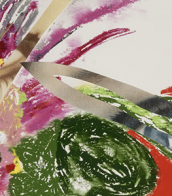

Bridget Louise Riley, an eminent English painter, has captivated the art world with her pioneering contributions to the Op Art movement. Born in London in 1931, Riley's early works were characterized by a figurative, semi-impressionist style. However, her artistic trajectory took a significant turn in the late 1950s and early 1960s when she began experimenting with optical illusions, leading to the development of her signature Op Art style. These works, utilizing geometric patterns in black and white, explored the dynamics of perception, creating disorienting effects and sensations of movement or color in the viewer.
Riley's exploration into color, which commenced in 1967, marked a new phase in her career. Her visit to Egypt in the early 1980s further enriched her palette, leading to the creation of works that reflected the vibrant hues of the Egyptian landscape. This period also saw the introduction of her 'Egyptian palette', which captured both the spirit of ancient and modern Egypt. Notable among her colorful works is "Cataract 3", where Riley utilized the contrast between warm and cold colors to produce a shifting, dynamic effect on the canvas, a testament to her continuous exploration of the interaction between form, color, and human perception.
Riley's work extends beyond canvas, with significant contributions to public art through murals. Her installations at prestigious institutions like the Tate, the Musée d'Art Moderne de la Ville de Paris, and the National Gallery, as well as a large-scale mural for the Chinati Foundation in Marfa, Texas, demonstrate her versatility and commitment to engaging with a broader public audience.
For collectors and experts in art and antiques, Riley's work represents a fascinating intersection of art, science, and perception, offering a unique visual experience that challenges and delights. Her dedication to expanding the boundaries of visual art ensures her place as a central figure in contemporary art discourse.
Sign up for updates related to Bridget Louise Riley to stay informed about new product sales and auction events showcasing her groundbreaking work. Join us in celebrating the legacy and ongoing journey of one of the foremost exponents of optical art.


Bridget Louise Riley, an eminent English painter, has captivated the art world with her pioneering contributions to the Op Art movement. Born in London in 1931, Riley's early works were characterized by a figurative, semi-impressionist style. However, her artistic trajectory took a significant turn in the late 1950s and early 1960s when she began experimenting with optical illusions, leading to the development of her signature Op Art style. These works, utilizing geometric patterns in black and white, explored the dynamics of perception, creating disorienting effects and sensations of movement or color in the viewer.
Riley's exploration into color, which commenced in 1967, marked a new phase in her career. Her visit to Egypt in the early 1980s further enriched her palette, leading to the creation of works that reflected the vibrant hues of the Egyptian landscape. This period also saw the introduction of her 'Egyptian palette', which captured both the spirit of ancient and modern Egypt. Notable among her colorful works is "Cataract 3", where Riley utilized the contrast between warm and cold colors to produce a shifting, dynamic effect on the canvas, a testament to her continuous exploration of the interaction between form, color, and human perception.
Riley's work extends beyond canvas, with significant contributions to public art through murals. Her installations at prestigious institutions like the Tate, the Musée d'Art Moderne de la Ville de Paris, and the National Gallery, as well as a large-scale mural for the Chinati Foundation in Marfa, Texas, demonstrate her versatility and commitment to engaging with a broader public audience.
For collectors and experts in art and antiques, Riley's work represents a fascinating intersection of art, science, and perception, offering a unique visual experience that challenges and delights. Her dedication to expanding the boundaries of visual art ensures her place as a central figure in contemporary art discourse.
Sign up for updates related to Bridget Louise Riley to stay informed about new product sales and auction events showcasing her groundbreaking work. Join us in celebrating the legacy and ongoing journey of one of the foremost exponents of optical art.


Bridget Louise Riley, an eminent English painter, has captivated the art world with her pioneering contributions to the Op Art movement. Born in London in 1931, Riley's early works were characterized by a figurative, semi-impressionist style. However, her artistic trajectory took a significant turn in the late 1950s and early 1960s when she began experimenting with optical illusions, leading to the development of her signature Op Art style. These works, utilizing geometric patterns in black and white, explored the dynamics of perception, creating disorienting effects and sensations of movement or color in the viewer.
Riley's exploration into color, which commenced in 1967, marked a new phase in her career. Her visit to Egypt in the early 1980s further enriched her palette, leading to the creation of works that reflected the vibrant hues of the Egyptian landscape. This period also saw the introduction of her 'Egyptian palette', which captured both the spirit of ancient and modern Egypt. Notable among her colorful works is "Cataract 3", where Riley utilized the contrast between warm and cold colors to produce a shifting, dynamic effect on the canvas, a testament to her continuous exploration of the interaction between form, color, and human perception.
Riley's work extends beyond canvas, with significant contributions to public art through murals. Her installations at prestigious institutions like the Tate, the Musée d'Art Moderne de la Ville de Paris, and the National Gallery, as well as a large-scale mural for the Chinati Foundation in Marfa, Texas, demonstrate her versatility and commitment to engaging with a broader public audience.
For collectors and experts in art and antiques, Riley's work represents a fascinating intersection of art, science, and perception, offering a unique visual experience that challenges and delights. Her dedication to expanding the boundaries of visual art ensures her place as a central figure in contemporary art discourse.
Sign up for updates related to Bridget Louise Riley to stay informed about new product sales and auction events showcasing her groundbreaking work. Join us in celebrating the legacy and ongoing journey of one of the foremost exponents of optical art.


Bridget Louise Riley, an eminent English painter, has captivated the art world with her pioneering contributions to the Op Art movement. Born in London in 1931, Riley's early works were characterized by a figurative, semi-impressionist style. However, her artistic trajectory took a significant turn in the late 1950s and early 1960s when she began experimenting with optical illusions, leading to the development of her signature Op Art style. These works, utilizing geometric patterns in black and white, explored the dynamics of perception, creating disorienting effects and sensations of movement or color in the viewer.
Riley's exploration into color, which commenced in 1967, marked a new phase in her career. Her visit to Egypt in the early 1980s further enriched her palette, leading to the creation of works that reflected the vibrant hues of the Egyptian landscape. This period also saw the introduction of her 'Egyptian palette', which captured both the spirit of ancient and modern Egypt. Notable among her colorful works is "Cataract 3", where Riley utilized the contrast between warm and cold colors to produce a shifting, dynamic effect on the canvas, a testament to her continuous exploration of the interaction between form, color, and human perception.
Riley's work extends beyond canvas, with significant contributions to public art through murals. Her installations at prestigious institutions like the Tate, the Musée d'Art Moderne de la Ville de Paris, and the National Gallery, as well as a large-scale mural for the Chinati Foundation in Marfa, Texas, demonstrate her versatility and commitment to engaging with a broader public audience.
For collectors and experts in art and antiques, Riley's work represents a fascinating intersection of art, science, and perception, offering a unique visual experience that challenges and delights. Her dedication to expanding the boundaries of visual art ensures her place as a central figure in contemporary art discourse.
Sign up for updates related to Bridget Louise Riley to stay informed about new product sales and auction events showcasing her groundbreaking work. Join us in celebrating the legacy and ongoing journey of one of the foremost exponents of optical art.


Bridget Louise Riley, an eminent English painter, has captivated the art world with her pioneering contributions to the Op Art movement. Born in London in 1931, Riley's early works were characterized by a figurative, semi-impressionist style. However, her artistic trajectory took a significant turn in the late 1950s and early 1960s when she began experimenting with optical illusions, leading to the development of her signature Op Art style. These works, utilizing geometric patterns in black and white, explored the dynamics of perception, creating disorienting effects and sensations of movement or color in the viewer.
Riley's exploration into color, which commenced in 1967, marked a new phase in her career. Her visit to Egypt in the early 1980s further enriched her palette, leading to the creation of works that reflected the vibrant hues of the Egyptian landscape. This period also saw the introduction of her 'Egyptian palette', which captured both the spirit of ancient and modern Egypt. Notable among her colorful works is "Cataract 3", where Riley utilized the contrast between warm and cold colors to produce a shifting, dynamic effect on the canvas, a testament to her continuous exploration of the interaction between form, color, and human perception.
Riley's work extends beyond canvas, with significant contributions to public art through murals. Her installations at prestigious institutions like the Tate, the Musée d'Art Moderne de la Ville de Paris, and the National Gallery, as well as a large-scale mural for the Chinati Foundation in Marfa, Texas, demonstrate her versatility and commitment to engaging with a broader public audience.
For collectors and experts in art and antiques, Riley's work represents a fascinating intersection of art, science, and perception, offering a unique visual experience that challenges and delights. Her dedication to expanding the boundaries of visual art ensures her place as a central figure in contemporary art discourse.
Sign up for updates related to Bridget Louise Riley to stay informed about new product sales and auction events showcasing her groundbreaking work. Join us in celebrating the legacy and ongoing journey of one of the foremost exponents of optical art.


Bridget Louise Riley, an eminent English painter, has captivated the art world with her pioneering contributions to the Op Art movement. Born in London in 1931, Riley's early works were characterized by a figurative, semi-impressionist style. However, her artistic trajectory took a significant turn in the late 1950s and early 1960s when she began experimenting with optical illusions, leading to the development of her signature Op Art style. These works, utilizing geometric patterns in black and white, explored the dynamics of perception, creating disorienting effects and sensations of movement or color in the viewer.
Riley's exploration into color, which commenced in 1967, marked a new phase in her career. Her visit to Egypt in the early 1980s further enriched her palette, leading to the creation of works that reflected the vibrant hues of the Egyptian landscape. This period also saw the introduction of her 'Egyptian palette', which captured both the spirit of ancient and modern Egypt. Notable among her colorful works is "Cataract 3", where Riley utilized the contrast between warm and cold colors to produce a shifting, dynamic effect on the canvas, a testament to her continuous exploration of the interaction between form, color, and human perception.
Riley's work extends beyond canvas, with significant contributions to public art through murals. Her installations at prestigious institutions like the Tate, the Musée d'Art Moderne de la Ville de Paris, and the National Gallery, as well as a large-scale mural for the Chinati Foundation in Marfa, Texas, demonstrate her versatility and commitment to engaging with a broader public audience.
For collectors and experts in art and antiques, Riley's work represents a fascinating intersection of art, science, and perception, offering a unique visual experience that challenges and delights. Her dedication to expanding the boundaries of visual art ensures her place as a central figure in contemporary art discourse.
Sign up for updates related to Bridget Louise Riley to stay informed about new product sales and auction events showcasing her groundbreaking work. Join us in celebrating the legacy and ongoing journey of one of the foremost exponents of optical art.
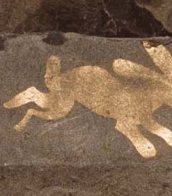

Bridget Louise Riley, an eminent English painter, has captivated the art world with her pioneering contributions to the Op Art movement. Born in London in 1931, Riley's early works were characterized by a figurative, semi-impressionist style. However, her artistic trajectory took a significant turn in the late 1950s and early 1960s when she began experimenting with optical illusions, leading to the development of her signature Op Art style. These works, utilizing geometric patterns in black and white, explored the dynamics of perception, creating disorienting effects and sensations of movement or color in the viewer.
Riley's exploration into color, which commenced in 1967, marked a new phase in her career. Her visit to Egypt in the early 1980s further enriched her palette, leading to the creation of works that reflected the vibrant hues of the Egyptian landscape. This period also saw the introduction of her 'Egyptian palette', which captured both the spirit of ancient and modern Egypt. Notable among her colorful works is "Cataract 3", where Riley utilized the contrast between warm and cold colors to produce a shifting, dynamic effect on the canvas, a testament to her continuous exploration of the interaction between form, color, and human perception.
Riley's work extends beyond canvas, with significant contributions to public art through murals. Her installations at prestigious institutions like the Tate, the Musée d'Art Moderne de la Ville de Paris, and the National Gallery, as well as a large-scale mural for the Chinati Foundation in Marfa, Texas, demonstrate her versatility and commitment to engaging with a broader public audience.
For collectors and experts in art and antiques, Riley's work represents a fascinating intersection of art, science, and perception, offering a unique visual experience that challenges and delights. Her dedication to expanding the boundaries of visual art ensures her place as a central figure in contemporary art discourse.
Sign up for updates related to Bridget Louise Riley to stay informed about new product sales and auction events showcasing her groundbreaking work. Join us in celebrating the legacy and ongoing journey of one of the foremost exponents of optical art.
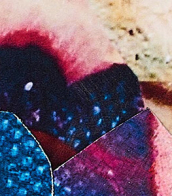

Bridget Louise Riley, an eminent English painter, has captivated the art world with her pioneering contributions to the Op Art movement. Born in London in 1931, Riley's early works were characterized by a figurative, semi-impressionist style. However, her artistic trajectory took a significant turn in the late 1950s and early 1960s when she began experimenting with optical illusions, leading to the development of her signature Op Art style. These works, utilizing geometric patterns in black and white, explored the dynamics of perception, creating disorienting effects and sensations of movement or color in the viewer.
Riley's exploration into color, which commenced in 1967, marked a new phase in her career. Her visit to Egypt in the early 1980s further enriched her palette, leading to the creation of works that reflected the vibrant hues of the Egyptian landscape. This period also saw the introduction of her 'Egyptian palette', which captured both the spirit of ancient and modern Egypt. Notable among her colorful works is "Cataract 3", where Riley utilized the contrast between warm and cold colors to produce a shifting, dynamic effect on the canvas, a testament to her continuous exploration of the interaction between form, color, and human perception.
Riley's work extends beyond canvas, with significant contributions to public art through murals. Her installations at prestigious institutions like the Tate, the Musée d'Art Moderne de la Ville de Paris, and the National Gallery, as well as a large-scale mural for the Chinati Foundation in Marfa, Texas, demonstrate her versatility and commitment to engaging with a broader public audience.
For collectors and experts in art and antiques, Riley's work represents a fascinating intersection of art, science, and perception, offering a unique visual experience that challenges and delights. Her dedication to expanding the boundaries of visual art ensures her place as a central figure in contemporary art discourse.
Sign up for updates related to Bridget Louise Riley to stay informed about new product sales and auction events showcasing her groundbreaking work. Join us in celebrating the legacy and ongoing journey of one of the foremost exponents of optical art.


Bridget Louise Riley, an eminent English painter, has captivated the art world with her pioneering contributions to the Op Art movement. Born in London in 1931, Riley's early works were characterized by a figurative, semi-impressionist style. However, her artistic trajectory took a significant turn in the late 1950s and early 1960s when she began experimenting with optical illusions, leading to the development of her signature Op Art style. These works, utilizing geometric patterns in black and white, explored the dynamics of perception, creating disorienting effects and sensations of movement or color in the viewer.
Riley's exploration into color, which commenced in 1967, marked a new phase in her career. Her visit to Egypt in the early 1980s further enriched her palette, leading to the creation of works that reflected the vibrant hues of the Egyptian landscape. This period also saw the introduction of her 'Egyptian palette', which captured both the spirit of ancient and modern Egypt. Notable among her colorful works is "Cataract 3", where Riley utilized the contrast between warm and cold colors to produce a shifting, dynamic effect on the canvas, a testament to her continuous exploration of the interaction between form, color, and human perception.
Riley's work extends beyond canvas, with significant contributions to public art through murals. Her installations at prestigious institutions like the Tate, the Musée d'Art Moderne de la Ville de Paris, and the National Gallery, as well as a large-scale mural for the Chinati Foundation in Marfa, Texas, demonstrate her versatility and commitment to engaging with a broader public audience.
For collectors and experts in art and antiques, Riley's work represents a fascinating intersection of art, science, and perception, offering a unique visual experience that challenges and delights. Her dedication to expanding the boundaries of visual art ensures her place as a central figure in contemporary art discourse.
Sign up for updates related to Bridget Louise Riley to stay informed about new product sales and auction events showcasing her groundbreaking work. Join us in celebrating the legacy and ongoing journey of one of the foremost exponents of optical art.
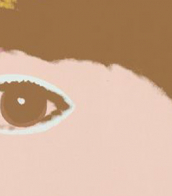

Bridget Louise Riley, an eminent English painter, has captivated the art world with her pioneering contributions to the Op Art movement. Born in London in 1931, Riley's early works were characterized by a figurative, semi-impressionist style. However, her artistic trajectory took a significant turn in the late 1950s and early 1960s when she began experimenting with optical illusions, leading to the development of her signature Op Art style. These works, utilizing geometric patterns in black and white, explored the dynamics of perception, creating disorienting effects and sensations of movement or color in the viewer.
Riley's exploration into color, which commenced in 1967, marked a new phase in her career. Her visit to Egypt in the early 1980s further enriched her palette, leading to the creation of works that reflected the vibrant hues of the Egyptian landscape. This period also saw the introduction of her 'Egyptian palette', which captured both the spirit of ancient and modern Egypt. Notable among her colorful works is "Cataract 3", where Riley utilized the contrast between warm and cold colors to produce a shifting, dynamic effect on the canvas, a testament to her continuous exploration of the interaction between form, color, and human perception.
Riley's work extends beyond canvas, with significant contributions to public art through murals. Her installations at prestigious institutions like the Tate, the Musée d'Art Moderne de la Ville de Paris, and the National Gallery, as well as a large-scale mural for the Chinati Foundation in Marfa, Texas, demonstrate her versatility and commitment to engaging with a broader public audience.
For collectors and experts in art and antiques, Riley's work represents a fascinating intersection of art, science, and perception, offering a unique visual experience that challenges and delights. Her dedication to expanding the boundaries of visual art ensures her place as a central figure in contemporary art discourse.
Sign up for updates related to Bridget Louise Riley to stay informed about new product sales and auction events showcasing her groundbreaking work. Join us in celebrating the legacy and ongoing journey of one of the foremost exponents of optical art.
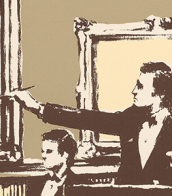

Bridget Louise Riley, an eminent English painter, has captivated the art world with her pioneering contributions to the Op Art movement. Born in London in 1931, Riley's early works were characterized by a figurative, semi-impressionist style. However, her artistic trajectory took a significant turn in the late 1950s and early 1960s when she began experimenting with optical illusions, leading to the development of her signature Op Art style. These works, utilizing geometric patterns in black and white, explored the dynamics of perception, creating disorienting effects and sensations of movement or color in the viewer.
Riley's exploration into color, which commenced in 1967, marked a new phase in her career. Her visit to Egypt in the early 1980s further enriched her palette, leading to the creation of works that reflected the vibrant hues of the Egyptian landscape. This period also saw the introduction of her 'Egyptian palette', which captured both the spirit of ancient and modern Egypt. Notable among her colorful works is "Cataract 3", where Riley utilized the contrast between warm and cold colors to produce a shifting, dynamic effect on the canvas, a testament to her continuous exploration of the interaction between form, color, and human perception.
Riley's work extends beyond canvas, with significant contributions to public art through murals. Her installations at prestigious institutions like the Tate, the Musée d'Art Moderne de la Ville de Paris, and the National Gallery, as well as a large-scale mural for the Chinati Foundation in Marfa, Texas, demonstrate her versatility and commitment to engaging with a broader public audience.
For collectors and experts in art and antiques, Riley's work represents a fascinating intersection of art, science, and perception, offering a unique visual experience that challenges and delights. Her dedication to expanding the boundaries of visual art ensures her place as a central figure in contemporary art discourse.
Sign up for updates related to Bridget Louise Riley to stay informed about new product sales and auction events showcasing her groundbreaking work. Join us in celebrating the legacy and ongoing journey of one of the foremost exponents of optical art.


Bridget Louise Riley, an eminent English painter, has captivated the art world with her pioneering contributions to the Op Art movement. Born in London in 1931, Riley's early works were characterized by a figurative, semi-impressionist style. However, her artistic trajectory took a significant turn in the late 1950s and early 1960s when she began experimenting with optical illusions, leading to the development of her signature Op Art style. These works, utilizing geometric patterns in black and white, explored the dynamics of perception, creating disorienting effects and sensations of movement or color in the viewer.
Riley's exploration into color, which commenced in 1967, marked a new phase in her career. Her visit to Egypt in the early 1980s further enriched her palette, leading to the creation of works that reflected the vibrant hues of the Egyptian landscape. This period also saw the introduction of her 'Egyptian palette', which captured both the spirit of ancient and modern Egypt. Notable among her colorful works is "Cataract 3", where Riley utilized the contrast between warm and cold colors to produce a shifting, dynamic effect on the canvas, a testament to her continuous exploration of the interaction between form, color, and human perception.
Riley's work extends beyond canvas, with significant contributions to public art through murals. Her installations at prestigious institutions like the Tate, the Musée d'Art Moderne de la Ville de Paris, and the National Gallery, as well as a large-scale mural for the Chinati Foundation in Marfa, Texas, demonstrate her versatility and commitment to engaging with a broader public audience.
For collectors and experts in art and antiques, Riley's work represents a fascinating intersection of art, science, and perception, offering a unique visual experience that challenges and delights. Her dedication to expanding the boundaries of visual art ensures her place as a central figure in contemporary art discourse.
Sign up for updates related to Bridget Louise Riley to stay informed about new product sales and auction events showcasing her groundbreaking work. Join us in celebrating the legacy and ongoing journey of one of the foremost exponents of optical art.
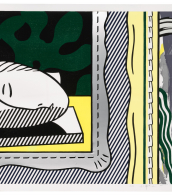

Bridget Louise Riley, an eminent English painter, has captivated the art world with her pioneering contributions to the Op Art movement. Born in London in 1931, Riley's early works were characterized by a figurative, semi-impressionist style. However, her artistic trajectory took a significant turn in the late 1950s and early 1960s when she began experimenting with optical illusions, leading to the development of her signature Op Art style. These works, utilizing geometric patterns in black and white, explored the dynamics of perception, creating disorienting effects and sensations of movement or color in the viewer.
Riley's exploration into color, which commenced in 1967, marked a new phase in her career. Her visit to Egypt in the early 1980s further enriched her palette, leading to the creation of works that reflected the vibrant hues of the Egyptian landscape. This period also saw the introduction of her 'Egyptian palette', which captured both the spirit of ancient and modern Egypt. Notable among her colorful works is "Cataract 3", where Riley utilized the contrast between warm and cold colors to produce a shifting, dynamic effect on the canvas, a testament to her continuous exploration of the interaction between form, color, and human perception.
Riley's work extends beyond canvas, with significant contributions to public art through murals. Her installations at prestigious institutions like the Tate, the Musée d'Art Moderne de la Ville de Paris, and the National Gallery, as well as a large-scale mural for the Chinati Foundation in Marfa, Texas, demonstrate her versatility and commitment to engaging with a broader public audience.
For collectors and experts in art and antiques, Riley's work represents a fascinating intersection of art, science, and perception, offering a unique visual experience that challenges and delights. Her dedication to expanding the boundaries of visual art ensures her place as a central figure in contemporary art discourse.
Sign up for updates related to Bridget Louise Riley to stay informed about new product sales and auction events showcasing her groundbreaking work. Join us in celebrating the legacy and ongoing journey of one of the foremost exponents of optical art.





